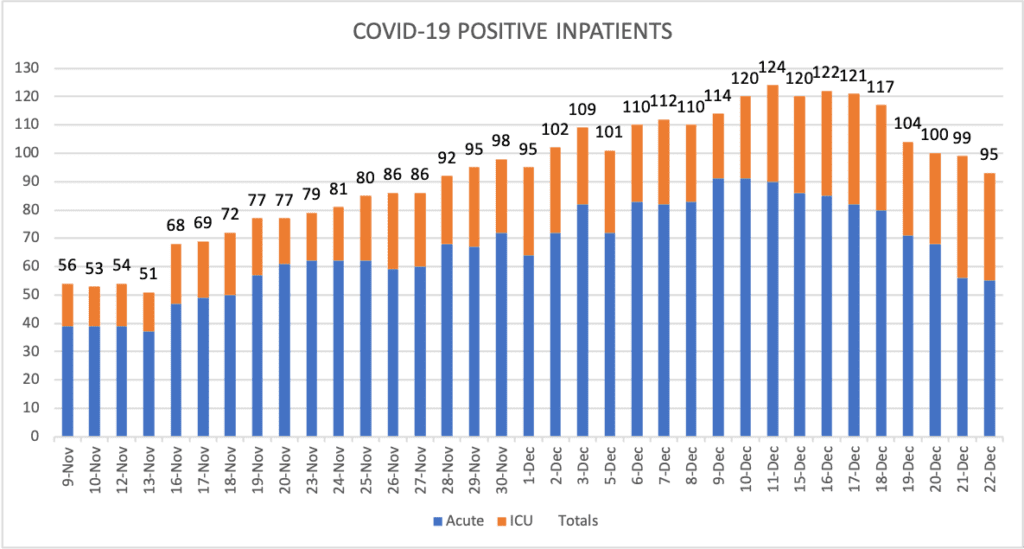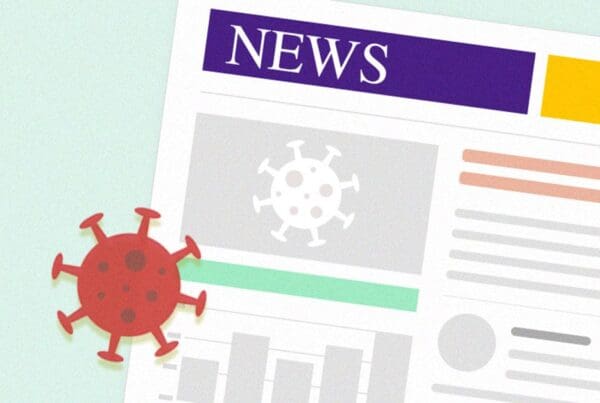Data Snapshot
UW Medicine Hospitals:

King County: The county reported 477 new positive cases and 0 new deaths on Dec. 21.
Washington: The state reported 218,415 cases and 3,106 deaths as of Dec. 20.
United States: The CDC reports 17,190,376 cases and 316,844 deaths as of Dec. 21.
Global: WHO reports 76,250,431 confirmed COVID-19 cases and 1,699,230 deaths as of Dec. 22.
Numbers update frequently, please follow links for most up-to-date numbers.
COVID-19 Literature Report
COVID-19 Literature Situation Report is a daily (M-F) newsletter put together by the Alliance for Pandemic Preparedness that provides a succinct summary of the latest scientific literature related to the COVID-19 pandemic.
Key Takeaways: COVID-19 Literature Situation Report Dec. 18, 2020
- A randomized trial found that tocilizumab reduced the risk of mechanical ventilation but did not prevent deaths among patients with COVID-19 pneumonia. More.
- Pulse oximetry was nearly three times more likely to fail to detect low levels of oxygen in the blood (hypoxemia) in Black patients compared to white patients, based on findings from a medical records review of a large cohort of inpatients receiving supplemental oxygen. More.
- COVID-19 has become the leading cause of death in the United States for people over age 35, surpassing average daily deaths due to heart disease and cancer. More.
COVID-19 Literature Surveillance Team, is an affiliated group of medical students, PhDs and physicians keeping up with the latest research on SARS-CoV-2 / COVID-19 by finding the newest articles, reading them, grading their level of evidence and bringing you the bottom line.
Read the latest report: Dec. 21 | Daily COVID-19 LST Report.
Listen to the latest podcast: Dec. 11 | COVID-19 LST Podcast.
UW Medicine in the News
CNBC: Covid vaccines will protect against new strains of the virus, U.S. doctor says
Video Featuring: Vin Gupta, IHME
- “Existing vaccines will be able to fight infection from new COVID-19 variants because emerging strains are likely to be genetically similar to prior ones, said Vin Gupta of the Institute for Health Metrics and Evaluation.”
- “His comments came after the U.K. on Saturday said it identified a new mutation of the virus that can spread more quickly.”
- “Gupta said the effectiveness of vaccines in producing antibodies to attack and kill COVID-19 is ‘extraordinary,’ and he doesn’t expect ‘minor changes at the genetic level’ to affect the vaccines’ performance for now.”
KOMO News: Despite arrival of COVID-19 vaccines, return to normal may be far off, doctors warn
Featuring: Ali Mokdad, IHME; Paul Pottinger, Allergy & Infectious Diseases
“‘What we are concerned is about the coming holidays,’ said Dr. Ali Mokdad, an infectious diseases expert at the University of Washington’s Institute for Health Metrics & Evaluation, singling out the Dec. 25 and Jan. 1 holidays. ‘If people here in the state of Washington maintain the same good behavior they practiced around Thanksgiving, we will have a lesser effect or impact on the surge that we are seeing right now everywhere in the United States and to some extent in our state. The holidays could potentially be a big hurdle for all of us,’ Mokdad said. ‘If we avoid it, it’s going to be much easier for all of us in the coming months.’ He warned that be letting our guard down too quickly, there’s a potential for another surge of COVID-19 cases and deaths in early spring when the weather starts to improve and the number of people being vaccinated greatly increases.”
Seattle Times: Teachers will be near the front of the COVID-19 vaccine line, students in the back. What does this mean for reopening schools?
Featuring: Helen Chu, Allergy & Infectious Diseases
‘“If you bring a bunch of children all back to school and none of them are vaccinated, there’s going to be some high risk child who is going to end up in the hospital,’ said Helen Chu, an infectious disease expert and associate professor at the University of Washington School of Medicine. ‘At an individual level, it’s going to be very hard, especially for parents of children who have underlying conditions that would put them at higher risk,’ she said. ‘But for society as a whole, it’s got to be a question of what is the lesser of the two evils’ — or, the risk of children getting infected versus continued isolation and academic backsliding.”
Tweet of the Week
At-home COVID-19 testing is here, but a word of caution from experts, including Geoff Baird @uwlabmedpath: “Testing doesn’t make things safe by itself…" Baird tells @voxdotcom. Keep socially distancing and masking even if you test negative.https://t.co/uxNUTRfQvo
— UW Medicine Newsroom (@uwmnewsroom) December 22, 2020

